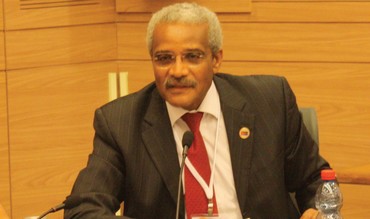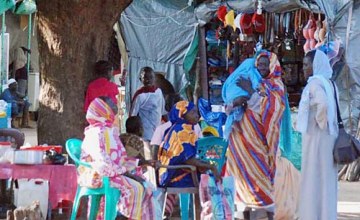‘Thank you for betraying your country,’ Eritrean envoy tells asylum-seeker at Knesset panel; 144 S. Sudanese head back to Juba.

Photo: Ben Hartman
Eritrea will not accept the forced repatriation of its nationals
living in Israel, Ambassador Tesfamariam Tekeste said on Monday, at a
lively and at times heated meeting of the Knesset Committee on Foreign
Workers.
Tekeste said his government’s position remains that it will welcome
those who choose to return and will help the Israeli government
determine which migrants are Eritreans. He also said his government
would ensure the safety of those returning and would not prosecute them
for leaving the country, except those who skipped out on mandatory
military service.
He then held up a list of what he said were the names of hundreds of
Eritreans who had come to his office in the past year to arrange their
voluntary return home.
Eritreans make up the
majority of the more than 60,000 African migrants
in Israel, with some estimates claiming there are over 40,000 in the
country. Their homeland is ruled by a dictatorship and Israel cannot
legally return Eritreans there due to the possibility of persecution
upon their return. Commonly referred to as the “North Korea of Africa,”
the country is ranked by Reporters Without Borders at the very bottom
(179 out of 179 countries) in terms of press freedom, and has been
accused of widespread human rights abuses against its citizens.
Tekeste began his remarks from a defensive stance, and expressed
concern about the presence of NGO representatives and Eritrean
asylumseekers, saying he was only coming to brief the government and
not get involved in a debate.
Committee chairman Nitzan Horowitz (Meretz) told him it was a
meeting open to the public and he would have the opportunity to respond
to any allegations against himself or his country.
Throughout the meeting, which was held in English, Tekeste was
dismissive of all claims presented against his country, which he said
is beset by allegations and demonization from “external forces” trying
to smear it. He defended the lack of democracy in Eritrea, where no
elections have been held since independence from Ethiopia was gained in
1993.
“We consider democracy a process; it should not be imposed. We
witnessed in our neighboring countries [that] because of elections,
people are now buying guns and sharpening their swords. This is the
history of Africa, where there is elections there is bloodshed.
[Elections] divide the society and the country and other African
countries have this, and we have our own recipe for our country,”
Tekeste said.
“People blackmail Eritrea, say we are not a democracy and a lot of
allegations because we don’t comply with their policies which have
their own agenda,” he added.
The ambassador admitted that his country has never had elections, at
which point MK Miri Regev (Likud) cracked that the Eritrean regime
resembles that of Avigdor Liberman’s Yisrael Beytenu party, which does
not hold elections for party leader.
Tekeste was later interrupted by a back-and-forth between Regev and
Horowitz in Hebrew, after which Horowitz apologized and said that “Miri
Regev is considering immigrating to Eritrea.”
While there have been allegations that the Eritrean regime has
encouraged its citizens to immigrate to Israel in order to send money
back to their cash-starved homeland, Tekeste blamed Israel for giving
work permits to Eritreans who arrived in 2006 and 2007, saying that it
has created an incentive for economic migrants to continue to move to
Israel.
Tekeste said he has followed the issue for the entire seven years he
has been stationed in Israel, at which point MK Ya’acov Katz (National
Union) asked, “Will you stay in Israel when your time is up?” He was
answered by Horowitz with, “Yes, he will move to a neighborhood in Beit
El.” Katz lives in the West Bank settlement.
Tekeste also claimed that Israel has granted group protection to
thousands of African migrants from Ethiopia and Sudan, who claim to be
Eritrean in order to remain in the country.
Horowitz then asked Tekeste about the UN position that Eritrean
asylum-seekers cannot be returned to the country because they might
face persecution.
He replied, “Well, as an Israeli member of the Knesset, do you
accept all the UN resolutions against Israel? Do you take it at face
value? I think we’re in the same position on this.”
Avi Granot, deputy directorgeneral of the Foreign Ministry’s Africa
department, described how Israel has had relations with Eritrea since
it became independent, but would prefer it chose a different path in
its internal politics.
“We value the strategic relevance and importance of Eritrea, but
this does not mean we agree on all variety of issues and politics. We
do realize that Eritrea has taken a certain policy of isolationism in
regards to its multilateral relations,” Granot said, earning a miffed
look from Tekeste with his reference to isolationism.
“That is Eritrea’s choice,” Granot said. “But that is not what we’d
welcome in our relation with Eritrea, we’d rather welcome greater
sharing of responsibilities.”
Granot also spoke about the desire to find a third country willing
to take in Israel’s Eritrean population, but said that since there are
20 million refugees and illegal migrants from Africa just within Africa
– including 200,000 Eritreans in Ethiopia – this has not yet borne
fruit.
Tekeste was beset by criticism of his country’s human rights record
by Amnesty International director in Israel Yonatan Gher and Tel Aviv
University Prof. Irit Beck as well as MK Dov Henin (Hadash). They said
accepting the ambassador’s assurances of refugees’ safety upon return
would be akin to a Syrian ambassador promising that Syrian refugees who
return from Turkey would not be harmed.
Tekeste said he would invite a delegation to visit Eritrea, saying
that people should not speak ill of his country without having visited
it. He then added: “Everyone told me before I was going to Israel that
it is hell. If you look at it from the outside you see hell, but seeing
is believing. Someone who has never been to Eritrea cannot give me a
lecture.”
As for accusations that the Eritrean Embassy is taking money from
migrants in Israel, who have to pay a “recovery tax” on their earnings
abroad, Tekeste said that this is done with Eritrean diaspora
communities around the world. He compared it to Israeli practice,
saying, “You Israelis collect money from Jewish communities all over the
world, any hospital I go to [in Israel] I see this donation from
somebody from here or there, so we can’t be accused of these issues.”
While Tekeste was criticizing protests held by Eritreans outside the
country’s embassy in Ramat Gan, an Eritrean man named Isaias shouted,
“It’s not like that, it’s not like that!” “Do I have to confront him?
Is this the aim of the meeting?” Tekeste asked. “Democracy is not
elastic, this is a problem of democracy.”
Isaias accused the ambassador of lying and said, “Eritrea is being
led by a group of people who have a dictatorial way of thinking, and
because of this we have been dispersed just like a seed all over the
world.”
He added that he never dreamed of coming to Israel, but fled after
seven years in Eritrean prison because “I love democracy, I love human
rights.”
The ambassador responded, “Thank you for betraying your country. You are talking so much nonsense.”
He then said that if Isaias “had any courage to fight for the
liberation of the country you should just come and fight for the
liberation of the country. Why did you cross so many countries’
borders? Why didn’t you stay in Sudan and fight us from there? This is
nonsense. If you had a gut and courage you would fight for the
liberation of the country like I did, when I spent years in the bush. I
am proud of that.”
The meeting concluded with Katz proposing a committee visit to
Eritrea to assess whether Israel can return Eritrean migrants to their
homeland. The proposal was greeted warmly by the ambassador.
On Monday night, a plane carrying 144 South Sudanese, including 53
minors, took off from Israel on a one-way flight to Juba. The
Population, Immigration and Borders Authority said that would bring to
271 the number of South Sudanese repatriated since the first flight
left last Sunday night.
Each adult received 1,000 euros and each child 500 euros.
PIBA spokeswoman Sabine Haddad said Israel had chartered an
Ethiopian Airlines plane for the flight, and there were plans for two
more flights next week. In total, 600 South Sudanese had agreed to
leave voluntarily, 300 had refused and were arrested and another 500
face deportation proceedings.
PIBA also said that 800 African migrants had entered Israel from Sinai this month, and they were all in prison.
 By JPOST.COM STAFF
By JPOST.COM STAFF


 Writing
on the June 28, 2012 issue of the newspaper, its journalist Bernard
Bridel believed that the Eritrean president, Isaias Afworki, is “a
warlord who runs a state as his guerrilla army”. He also extensively
quotes a 248-page book published in French this year by Leonard Vincent,
a journalist of the Reporters Without Boarders, who wrote that Eritrea
is already “an African version of North Korea”.
Writing
on the June 28, 2012 issue of the newspaper, its journalist Bernard
Bridel believed that the Eritrean president, Isaias Afworki, is “a
warlord who runs a state as his guerrilla army”. He also extensively
quotes a 248-page book published in French this year by Leonard Vincent,
a journalist of the Reporters Without Boarders, who wrote that Eritrea
is already “an African version of North Korea”.



